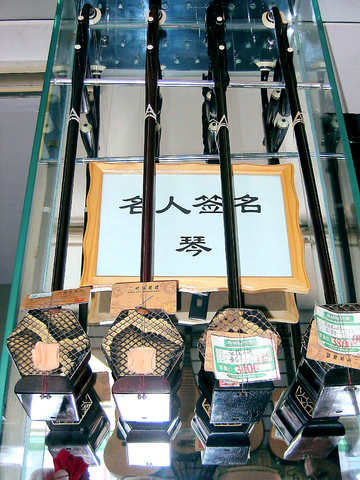he sad and sonorous sound of the erhu, the musical instrument that epitomizes Chinese music, is weathering an attack from nature lovers who fear its snake skin covered sound box is driving the mighty python into extinction.
Favorably compared to the violin, the erhu is revered in China for its natural sound and has long been viewed as the instrument that best reflects the human voice, most notably a weeping lady.
Countless pieces of music, mostly sad and melancholy, have been written for the long-necked two-stringed instrument, played with a horsehair bow and boasting a more than 1,000 year history.

PHOTO: AFP
"The most important part of the erhu is the python skin, the reverberations of the skin give the erhu its unique sound," said Yang Youlin, manager of the Beijing Music Book Store.
"Without the python skin, an erhu is not an erhu. Snake skin, sheep skin, wood, won't do."
Even the cost of an erhu, which range up to 8,000 yuan (US$1,000), depends on what part of the python is used for the sound box membrane, with seasoned erhu players preferring the belly side of the snake near the tail, Yang said.

PHOTO: AFP
"A lot of factors go into the sound -- the age of the snake, the size and the uniformity of the scales and the thickness of the skin are all important," Yang said.
The problem is that with China's economy booming, more and more people are buying and learning to play the instrument.
China's opening up to the West has also ensured that an increasing number of overseas fans, especially in Japan and Singapore, are also buying the instrument.
Other instruments, like the sanxian, a three stringed plucked instrument, also uses a python skinned sound box, while python skins have long been used for Chinese drums and tambourines.
The nation's growing demand for python is further stepping up competition internationally where python skins are valued in the usual reptilian fare of purses, wallets, jackets, boots, belts and bags.
"The python has been nearly extinct in China in the wild since the 1980s and much of this is because of the demand for python skins in the music industry," said Xu Hongfa, a wildlife trade expert for TRAFFIC East Asia, a group that monitors the trafficking in endangered species.
"Since then, the wild populations in Southeast Asia have begun to fall and the smuggling of python skins from Southeast Asia into China has grown."
A relish for python meat in southern China, he said, has also played a role in the demise of the snake that thrives in a jungle setting and can grow to up to 6m long.
After ratifying the UN Convention on the International Trade in Endangered Species (CITES), China passed its Law on the Protection of Endangered Species in 1988, effectively making the unlicensed use and trade in pythons illegal, Xu said.
But implementation of the law has not been easy, prompting TRAFFIC East Asia and other environmental groups to work with the State Forestry Administration to set up a certification process between python skin sellers in Southeast Asia and musical instrument factories in China.
New regulations that went into effect on Jan. 1 also require that all erhus have a certificate from the administration, which certify that the erhu python skin is not made with wild pythons, but from farm-raised pythons, he said.
Individuals are now only allowed to take two erhus out of China when travelling, while commercial buyers also need additional export certificates.
"The situation was getting out of hand, so the government had to do something," said Feng Yuankai, spokesman for the China Musical Instrument Association.
"Basically the manufacturers have supported and embraced the new policy as a way to maintain a sustainable industry, the certification also means that they are legally trading in python skins, which was not the case before the new regulations."
In 2003, China's nearly 100 erhu manufacturing enterprises used some 30,000 python skins to produce about 400,000 erhus, with production expected to continue rising with growing international demand, Feng said.
"This is a 1,000-year-old tradition in China, so at first I think that the manufacturers were not too happy about the new policy," said TRAFFIC East Asia's Hu.
"The new regulations have resulted in the price of python skin rising by almost 100 percent, but now the manufacturers are finding that they can raise the price of their erhu as well, which I think they like."

Towering high above Taiwan’s capital city at 508 meters, Taipei 101 dominates the skyline. The earthquake-proof skyscraper of steel and glass has captured the imagination of professional rock climber Alex Honnold for more than a decade. Tomorrow morning, he will climb it in his signature free solo style — without ropes or protective equipment. And Netflix will broadcast it — live. The event’s announcement has drawn both excitement and trepidation, as well as some concerns over the ethical implications of attempting such a high-risk endeavor on live broadcast. Many have questioned Honnold’s desire to continues his free-solo climbs now that he’s a

As Taiwan’s second most populous city, Taichung looms large in the electoral map. Taiwanese political commentators describe it — along with neighboring Changhua County — as Taiwan’s “swing states” (搖擺州), which is a curious direct borrowing from American election terminology. In the early post-Martial Law era, Taichung was referred to as a “desert of democracy” because while the Democratic Progressive Party (DPP) was winning elections in the north and south, Taichung remained staunchly loyal to the Chinese Nationalist Party (KMT). That changed over time, but in both Changhua and Taichung, the DPP still suffers from a “one-term curse,” with the

Lines between cop and criminal get murky in Joe Carnahan’s The Rip, a crime thriller set across one foggy Miami night, starring Matt Damon and Ben Affleck. Damon and Affleck, of course, are so closely associated with Boston — most recently they produced the 2024 heist movie The Instigators there — that a detour to South Florida puts them, a little awkwardly, in an entirely different movie landscape. This is Miami Vice territory or Elmore Leonard Land, not Southie or The Town. In The Rip, they play Miami narcotics officers who come upon a cartel stash house that Lt. Dane Dumars (Damon)

Jan. 26 to Feb. 1 Nearly 90 years after it was last recorded, the Basay language was taught in a classroom for the first time in September last year. Over the following three months, students learned its sounds along with the customs and folktales of the Ketagalan people, who once spoke it across northern Taiwan. Although each Ketagalan settlement had its own language, Basay functioned as a common trade language. By the late 19th century, it had largely fallen out of daily use as speakers shifted to Hoklo (commonly known as Taiwanese), surviving only in fragments remembered by the elderly. In